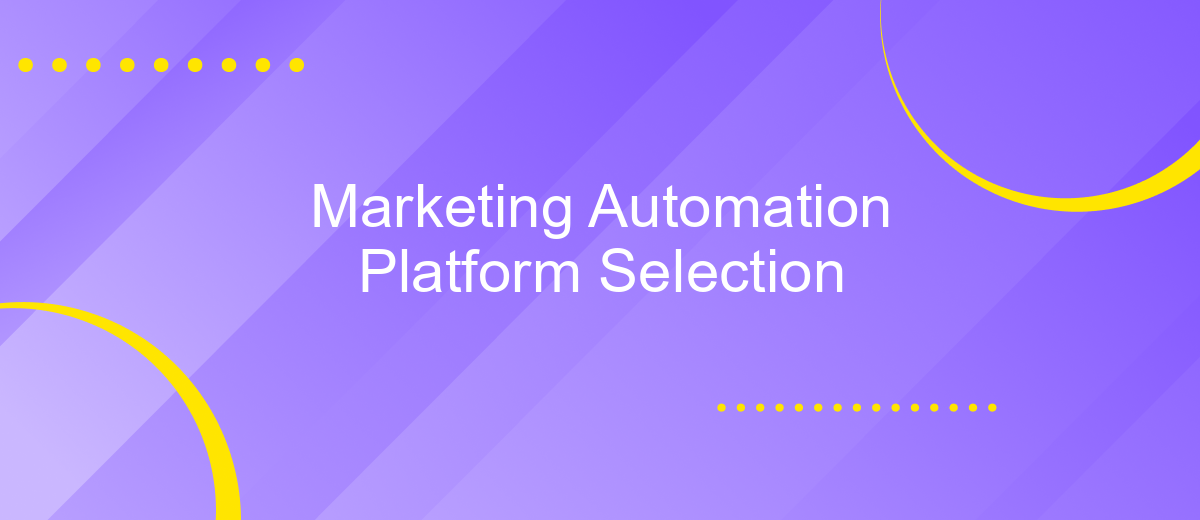Marketing Automation Platform Selection
Choosing the right marketing automation platform is crucial for optimizing your marketing efforts and achieving business growth. With countless options available, it's essential to understand your specific needs and evaluate key features such as user-friendliness, integration capabilities, and scalability. This article will guide you through the critical factors to consider, helping you make an informed decision that aligns with your strategic objectives.
Introduction
In today's fast-paced digital landscape, businesses are constantly seeking ways to streamline their marketing efforts and achieve better results. Marketing automation platforms have emerged as powerful tools to help organizations automate repetitive tasks, target the right audience, and measure the effectiveness of their campaigns. Selecting the right marketing automation platform can be a daunting task, given the plethora of options available in the market.
- Assessing your business needs and objectives
- Evaluating the platform's features and capabilities
- Considering integration with existing systems
- Analyzing cost and return on investment
- Reviewing user feedback and case studies
By carefully considering these factors, businesses can make an informed decision that aligns with their marketing goals and budget. This introduction aims to guide you through the critical aspects of selecting a marketing automation platform, ensuring that you choose a solution that enhances your marketing efficiency and drives growth.
Key Considerations

When selecting a marketing automation platform, it is crucial to evaluate the scalability and flexibility of the system. Ensure that the platform can grow with your business and adapt to your evolving marketing needs. Additionally, consider the ease of use and the learning curve associated with the platform. A user-friendly interface can significantly reduce the time and resources required for training and implementation.
Another key consideration is the platform's ability to integrate with your existing tools and systems. Seamless integration can streamline your marketing processes and improve overall efficiency. Services like ApiX-Drive can facilitate these integrations, allowing you to connect various applications without extensive technical expertise. Finally, assess the level of customer support and resources available, as robust support can be invaluable in addressing any challenges that arise during the implementation and use of the platform.
Evaluation Criteria

When selecting a marketing automation platform, it is crucial to consider several key criteria to ensure the tool aligns with your business needs and objectives. A comprehensive evaluation will help you make an informed decision and maximize the return on your investment.
- Features and Functionality: Assess the range of features offered, including email marketing, social media integration, lead scoring, and analytics capabilities.
- Ease of Use: Evaluate the user interface and overall usability. The platform should be intuitive and easy for your team to navigate and operate without extensive training.
- Integration Capabilities: Ensure the platform can seamlessly integrate with your existing CRM, CMS, and other essential tools.
- Scalability: Consider whether the platform can grow with your business and accommodate increasing volumes of data and users.
- Customer Support: Review the level of support provided, including availability, responsiveness, and the quality of resources such as documentation and training materials.
- Cost: Analyze the pricing structure and ensure it fits within your budget while offering good value for the features provided.
By carefully considering these criteria, you can select a marketing automation platform that not only meets your current needs but also supports your long-term business goals. A well-chosen platform will enhance your marketing efforts, streamline processes, and ultimately drive better results.
Implementation and Integration

Implementing and integrating a marketing automation platform requires careful planning and execution. Firstly, conduct a thorough assessment of your current marketing processes and identify areas where automation can enhance efficiency. This will help in setting clear goals and expectations for the new system.
Next, ensure that your team is well-prepared for the transition. Provide comprehensive training sessions to familiarize them with the new platform's features and functionalities. This step is crucial to ensure smooth adoption and minimize resistance to change.
- Assess current marketing processes
- Set clear goals and expectations
- Provide comprehensive training for the team
- Ensure seamless data migration
- Integrate with existing tools and systems
Finally, monitor the performance of the platform post-implementation. Regularly review key metrics to measure the effectiveness of the automation and make necessary adjustments. Continuous evaluation and optimization will ensure that the platform delivers maximum value and supports your marketing objectives effectively.
- Automate the work of an online store or landing
- Empower through integration
- Don't spend money on programmers and integrators
- Save time by automating routine tasks
Best Practices and Trends
When selecting a marketing automation platform, it's crucial to focus on integration capabilities. Seamless integration with your existing CRM, email marketing, and analytics tools can significantly enhance your marketing efforts. A service like ApiX-Drive can be invaluable, offering easy setup and management of integrations without requiring extensive technical knowledge. This ensures that your marketing data flows smoothly between platforms, enabling more effective campaign management and performance tracking.
Staying updated with current trends is also essential. Personalization remains a top priority, with AI-driven tools providing more tailored customer experiences. Additionally, omnichannel marketing is becoming increasingly important, requiring platforms that can manage campaigns across various channels like social media, email, and SMS. Automation of repetitive tasks, such as scheduling posts and sending follow-up emails, allows marketing teams to focus on strategy and creative aspects. By adopting these best practices and staying ahead of trends, businesses can maximize the impact of their marketing automation efforts.
FAQ
What is a Marketing Automation Platform?
How do I choose the right Marketing Automation Platform for my business?
Can a Marketing Automation Platform integrate with my existing systems?
What are the key features to look for in a Marketing Automation Platform?
How can I ensure a successful implementation of a Marketing Automation Platform?
Time is the most valuable resource in today's business realities. By eliminating the routine from work processes, you will get more opportunities to implement the most daring plans and ideas. Choose – you can continue to waste time, money and nerves on inefficient solutions, or you can use ApiX-Drive, automating work processes and achieving results with minimal investment of money, effort and human resources.


